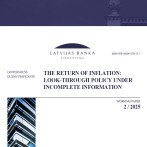Consumer price level in January grew slower than average over the past ten years
In January, annual inflation remained very low (0.4%), but turned positive, as the excise tax on tobacco and auto gas rose somewhat and there was a small increase in thermal energy and several non-regulated services prices. The seasonal rise in vegetable and potato prices was greater than last year, raising the annual inflation by 0.2 percentage points and thus accounting for half of the annual inflation.
The impact of external factors on the price level was favourable – the average level of oil prices did not exceed what was observed in December; global food prices even dropped slightly, mostly due to sugar prices dropping; the increased trade volumes and first good harvests in the Southern hemisphere had a favourable effect on grain product prices.
The influence of external factors limited the average price hikes of goods that amounted to 0.5% month-on-month. The prices of services in the meantime increased 1.1% month-on-month, which is slightly less than the January average for the previous ten years (even including a period with dropping prices). This January, prices primarily went up on services related to tourism and catering as well as personal care, which is characteristic of economic growth conditions, and a gradual rise in income.
The annual inflation level in the coming months will continue to hover in the positive range as is usual for the conditions of economic growth. Yet there are several factors that may continue to act to keep inflation low. For example, a small drop in the price of natural gas was already seen in December (for industrial consumers; and that had a favourable effect on the price of thermal energy) and January (for households). In its January assessments, AS "Latvijas Gāze" estimates that the price of natural gas for industrial consumers, including producers of thermal energy, could drop slightly more in the next few months. In mid-January, the price of thermal energy went up slightly in Valmiera, but in March it will drop in Daugavpils. The price of public transport in Riga could remain at the existing (lower than last year) level until December. Over the year, the inter-operator settlement tariffs could also drop (that will bring down the price of communication services).
The data of the price watching initiative for July-January indicate that, converting attractive and so-called round prices from lats to euro there are cases where the prices have dropped and others where they have risen. Although the number of instances where the prices have risen is slightly larger, the amount of drops is even greater. Since the amount of goods and services used in monitoring does not reflect the consumer price index (CPI), we cannot talk here of a precise assessment of the effect on inflation. In addition, many price changes could be short-lived and that is why the impact of price changes on inflation untypical for the season (e.g., euro introduction) will be possible to evaluate only in the spring or summer of this year.
Textual error
«… …»






